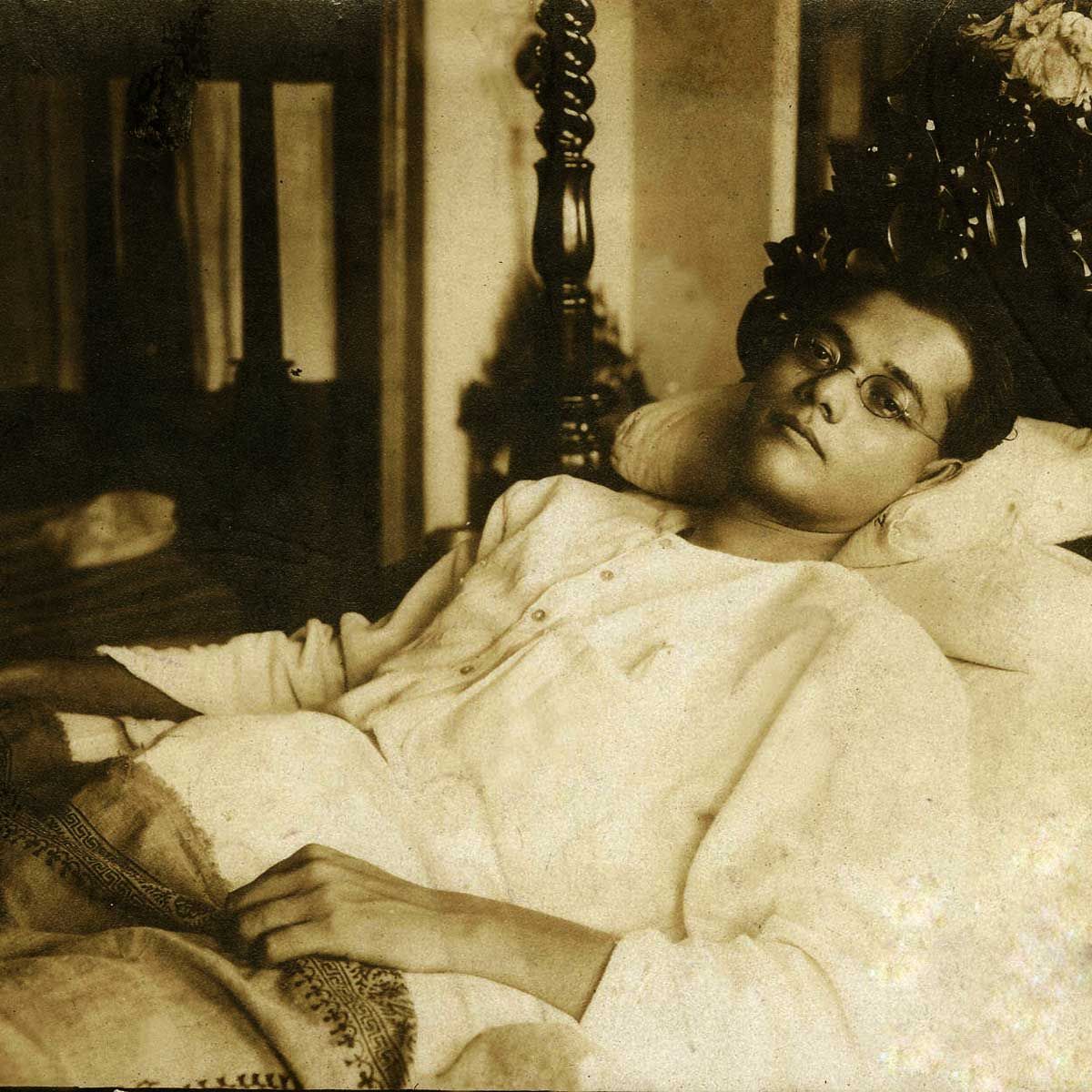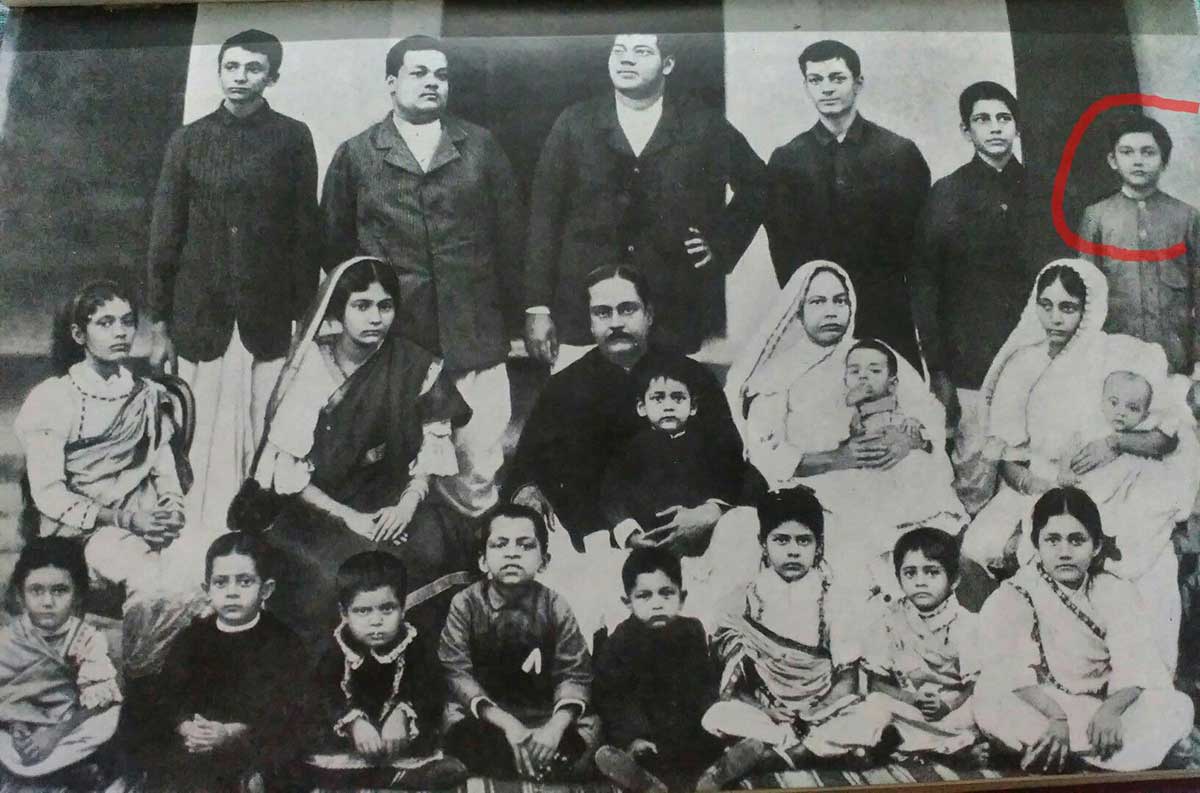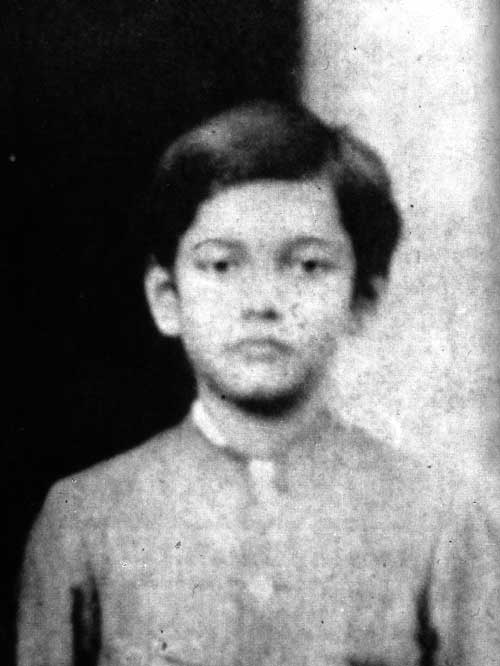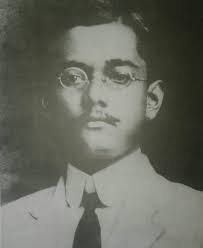Sanatan Articles
Satyaagrah
Written on
Satyaagrah
Written on
Satyaagrah
Written on
Satyaagrah
Written on
Satyaagrah
Written on
JOIN SATYAAGRAH SOCIAL MEDIA
Birth, Parentage and Early Environment - An Indian Pilgrim (Netaji's Life and writings)

My father, Janakinath Bose, had migrated to Orissa in the eighties of the last century and had settled down at Cuttack as a lawyer. There I was born on Saturday, the 23rd January, 1897. My father was descended from the Boses of Mahinagar, while my mother, Prabhabati (or rather Prabhavati) belonged to the family of the Dutts of Hat- khola. I was the sixth son and the ninth child of my parents.
In these days of rapid communication, a night’s journey by train southwards along the eastern coast takes one from Calcutta to Cuttack and on the way there is neither adventure nor romance. But things were not quite the same sixty years ago. One had to go either by cart and encounter thieves and robbers on the road, or by sea and brave the wrath of the winds and the waves. Since it was safer to trust in God than in brother man, it was more common to travel by boat. Sea-going vessels would carry passengers up to Chandbali where transhipment would take place and from Chandbali steamers would get to Cuttack through a number of rivers and canals. The description I .used to hear from my mother since childhood of the rolling and pitching and the accompanying discom¬ fort during the voyage would leave no desire in me to undergo such an experience. At a time when distances were long and journey by no means safe, my father must have had plenty of pluck to leave his village home and go far away in search of a career. Fortune favours the brave even in civil life and, by the time I was born, my father had already made a position for himself and was almost at the top of the legal profession in his new domicile.
 Netaji with his brother and sister and his parents the red circle |
Though a comparatively small town with a population in the neighbourhood of 20,000, Cuttack 1 had an importance of its own owing to a variety of factors. It had an unbroken tradition since the days of the early Hindu Kings of Kalinga. It was de facto capital of Orissa which could boast of such a famous place of pilgrimage as Puri (or Jagannath) and such glorious art-relics as those of Konarak, Bhuvaneswar, and Udaigiri. It was the head¬ quarters not only for the British administration in Orissa, but also for the numerous ruling chiefs in that province. Altogether, Cuttack afforded a healthy environment for the growing child, and it had some of the virtues of both city and country life.
Ours was not a rich but what might be regarded as a well-to-do, middle-class family. Naturally, I had no personal experience of what want and poverty meant and had no occasion to develop those traits of selfishness, greed, and the rest which are sometimes the unwelcome heritage of indigent circumstances in one’s early life. At the same time, there was not that luxury and lavishness in our home which has been the ruin of so many promising but pampered young souls or has helped to foster a supercilious, high-brow mentality in them. In fact, considering their worldly means my parents always erred—and, I dare say, rightly too—on the side of simplicity in the upbringing of their children.
The earliest recollection I have of myself is that I used to feel like a thoroughly insignificant being. My parents awed me to a degree. My father usually had a cloak of reserve round him and kept his children at a distance. What with his professional work and what with his public duties, he did not have much time for his family. The time he could spare was naturally divided among his numerous sons and daughters. The youngest child did, of course, come in for an extra dose of fondling, but an addition to the family would soon rob it of its title to special favour. And for the grown-ups it was difficult to discern whom father loved more, so strictly impartial he appeared to be, whatever his inner feelings might have been.
And my mother? Though she was more humane and it was not impossible at times to detect her bias, she was also held in awe by most of her children. No doubt she ruled the roost and, where family affairs were concerned, hers was usually the last word. She had a strong will, and, when one added to that a keen sense of reality and sound common-sense, it is easy to understand how she could dominate the domestic scene. In spite of all the respect I cherished for my parents since my early years, I did yearn for a more intimate contact with them and could not help envying those children who were lucky to be on friendly terms with their parents. This desire presumably arose out of a sensitive and emotional temperament.
 |
But to be overawed by my parents was not the only tragedy. The presence of so many elder brothers and sisters seemed to relegate me into utter insignificance. That was perhaps all to the good. I started life with a sense of diffidence—with a feeling that I should live up to the level already attained by those who had preceded me. For good or for ill, I was free from over-confidence or cock-sureness. I lacked innate genius but had no tendency to shirk hard work. I had, I believe, a subconscious feeling that for mediocre men industry and good behaviour are the sole passports to success.
To be a member of a large family is, in many ways, a drawback. One does not get the individual attention which is often necessary in childhood. Moreover, one is lost in a crowd as it were, and the growth of personality suffers in consequence. On the other hand, one develops sociability and overcomes self-centeredness and angularity.
From infancy I was accustomed to living not merely in the midst of a large number of sisters and brothers, but also with uncles and cousins. The denotation of the word 'family’ was therefore automatically enlarged. What is more, our house had always an open door for distant relatives hailing from our ancestral village. And, in accordance with a long-standing Indian custom, any visitors to the town of Cuttack who bore the stamp of respectability could—with or without an introduction—drive to our house and expect to be put up there. Where the hotel-system is not so much in vogue and decent hotels are lacking, society has somehow to provide for a social need.
 |
The largeness of our household was due not merely to the size of the family, but to the number of dependents and servants as well—and to the representatives of the animal world—cows, horses, goats, sheep, deer, peacock, birds, mongoose, ets. The servants were an institution by themselves and formed an integral part of the household. Most of them had been in service long before I was born and some of them (e.g. the oldest maid-servant) were held in respect by all of us.1 Commercialism had not then permeated and distorted human relationship; so there was considerable attachment between our servants and our¬ selves. This early experience shaped my subsequent mental attitude towards servants as a class.
Though the family environment naturally helped to broaden my mind, it could not, nevertheless, rid me of that shy reserve which was to haunt me for years later and which I doubt if I have yet been able to shake off. Perhaps I was and still remain an introvert.
References:
archive.org
Netaji: Collected Works Volume 1 - An Indian Pilgrim An Unfinished Autobiography - Subhas Chandra Bose (edited by Sisir Kumar Bose and Sugata Bose)
 Support Us
Support Us
Satyagraha was born from the heart of our land, with an undying aim to unveil the true essence of Bharat. It seeks to illuminate the hidden tales of our valiant freedom fighters and the rich chronicles that haven't yet sung their complete melody in the mainstream.
While platforms like NDTV and 'The Wire' effortlessly garner funds under the banner of safeguarding democracy, we at Satyagraha walk a different path. Our strength and resonance come from you. In this journey to weave a stronger Bharat, every little contribution amplifies our voice. Let's come together, contribute as you can, and champion the true spirit of our nation.
 |  |  |
| ICICI Bank of Satyaagrah | Razorpay Bank of Satyaagrah | PayPal Bank of Satyaagrah - For International Payments |
If all above doesn't work, then try the LINK below:
Please share the article on other platforms
DISCLAIMER: The author is solely responsible for the views expressed in this article. The author carries the responsibility for citing and/or licensing of images utilized within the text. The website also frequently uses non-commercial images for representational purposes only in line with the article. We are not responsible for the authenticity of such images. If some images have a copyright issue, we request the person/entity to contact us at This email address is being protected from spambots. You need JavaScript enabled to view it. and we will take the necessary actions to resolve the issue.
Related Articles
- Saraswathi Rajamani, at 16, became the youngest and first female spy for INA, boldly recruited by Netaji in 1942, courageously spent two years spying on the British in Myanmar during WWII, a pivotal yet overlooked heroine in India's struggle for freedom
- Netaji, an Impossible man can never be boxed into an ideological corner: Not just the most enigmatic figure in world history but his life is also a tough lesson in how to think about history
- Father of the Nation! Absolutely not. Mohandas Karamchand Gandhi was not the father of the nation either officially or otherwise
- Cross Agent and the hidden truth of massacre of Jallianwala Bagh - Martyrdom of Shaheed Bhagat Singh (Some Hidden Facts)
- At school Part I - An Indian Pilgrim (Netaji's Life and writings)
- Anuj Dhar claims that Subhas Chandra Bose was suspected of being ‘poisoned’ after ouster from the post of Congress president
- Theft on a Grand Scale - Britain stole $45 Trillion from India and lied about it. Indian money developed Britain and Other Countries
- Birth of our National Anthem: Original recording of 'Jana Gana Mana' performed by the Radio Symphony Orchestra of Hamburg, Germany, 1942 in the presence of Netaji Subhash Chandra Bose
- A Great man Beyond Criticism - Martyrdom of Shaheed Bhagat Singh (Some Hidden Facts)
- Northeast is not the Part of Pakistan because of 'Netaji': Subhas Bose and the ‘special’ case of Assam
- Taiwan govt has decided to open up its National archives to study and rediscover the legacy of Netaji Subash Chandra Bose: Deputy representative Mumin Chen said that Netaji has had a huge influence over Taiwan in the 1930s and 40s
- Vinayak Damodar Savarkar – A Misunderstood Legacy
- British PM accepted that “the tide of nationalism is running very fast in India" and the mutiny of the Royal Indian Navy in 1946 forced colonial masters Britain to leave India: What followed was betrayal by Congress
- Hero of Pawankhind: Veer Maratha Bajiprabhu Deshpande, who led 300 Soldiers against 12000 Adilshahi Army defending Shivaji
- Our first true war of independence lie forgotten within the fog of time and tomes of propaganda: Sanyasi Rebellion, when "renouncers of the material world" lead peasants in revolt against British and fundamentalist islamic clans





















